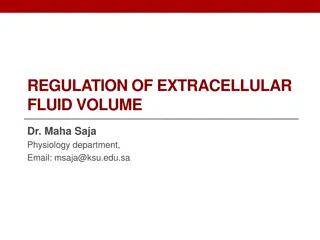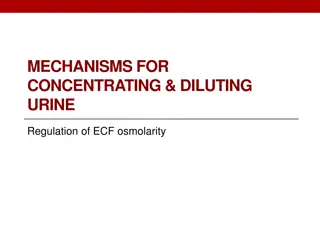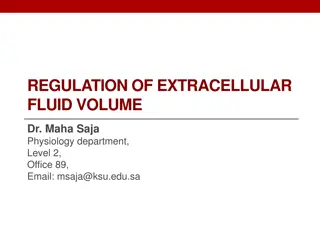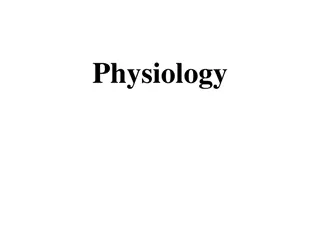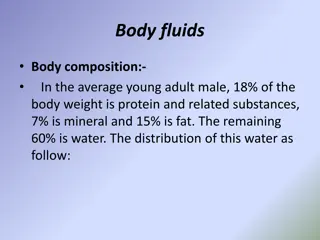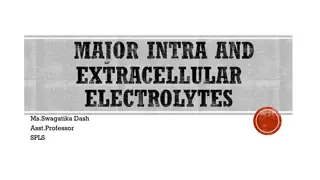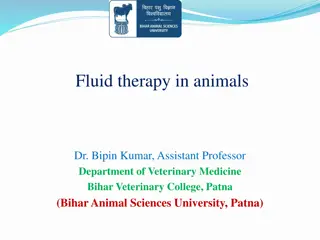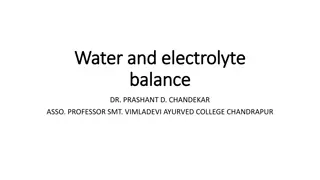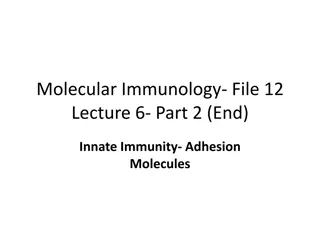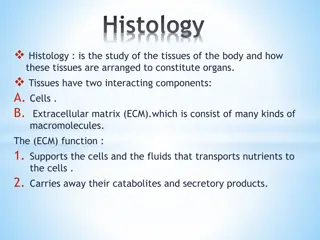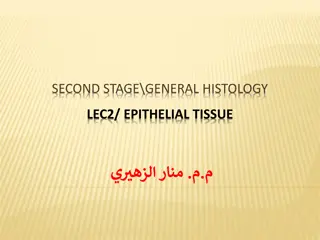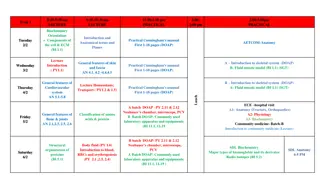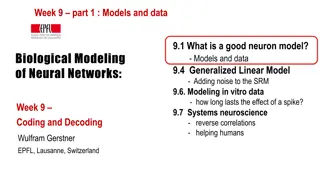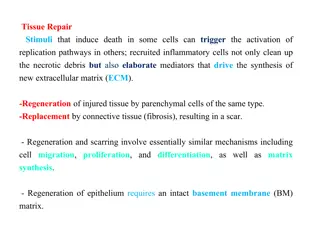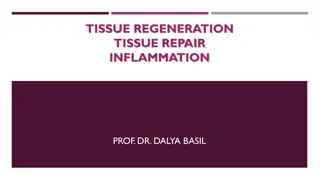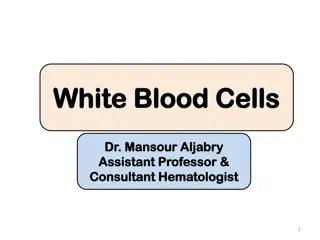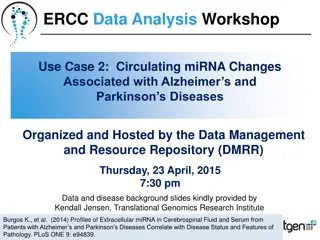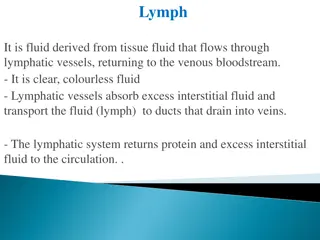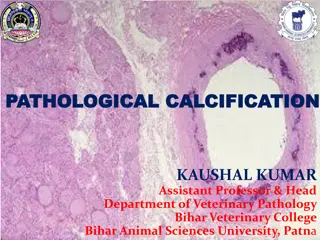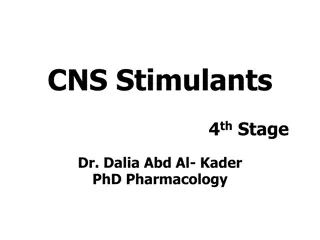Understanding Plasma Proteins and Their Functions
Plasma proteins play a crucial role in various physiological functions such as controlling extracellular fluid distribution and transportation of hormones, vitamins, and other substances. The balance between protein synthesis and catabolism determines protein levels in the vascular compartment, affe
6 views • 23 slides
Understanding Extracellular Matrix (ECM) and Its Functions
Extracellular Matrix (ECM) is a complex network of proteins, glycoproteins, and macromolecules that provide structural support, regulate cell activities, and play crucial roles in various tissues. It consists of two main types - interstitial matrix and basement membrane, each serving specific functi
12 views • 25 slides
Understanding Physiological Acid-Base Balance in Pharmaceutical Inorganic Chemistry
This lecture delves into the fundamental concepts of pharmaceutical inorganic chemistry, focusing on the mechanisms and uses of various pharmaceutical products that correct body disorders. Topics covered include acids and bases, intra and extracellular electrolytes, and the role of buffers in mainta
10 views • 14 slides
Regulation of Extracellular Fluid Volume in Renal Physiology
This lecture focuses on the mechanisms involved in the regulation of extracellular fluid volume, primarily highlighting the role of sensors, effectors, and the kidney in maintaining body fluid balance. It discusses the importance of regulating extracellular fluid volume and osmolarity for controllin
0 views • 25 slides
Plasma Exchange in Treatment of PANS - Overview and Considerations
Plasmapheresis, a type of apheresis, plays a crucial role in managing Pediatric Acute-onset Neuropsychiatric Syndrome (PANS) and Pediatric Autoimmune Neuropsychiatric Disorders Associated with Streptococcal Infections (PANDAS). This treatment involves separating the extracellular component of blood
0 views • 26 slides
Understanding Mechanisms for Concentrating & Diluting Urine in Maintaining ECF Osmolarity
Explore the intricate processes involved in concentrating and diluting urine to regulate extracellular fluid (ECF) osmolarity through mechanisms like the loop of Henle and vasa recta. Understand the factors influencing the ability to create a concentrated medullary gradient, differentiate water diur
0 views • 26 slides
Regulation of Extracellular Fluid Volume: A Comprehensive Overview
Understanding the intricate mechanisms involved in the regulation of extracellular fluid volume is essential for maintaining normal body function. This includes sensor and effector roles in renal regulation, the influence of aldosterone on Na+ reabsorption, the significance of Na+ balance, and the i
1 views • 22 slides
Cell Communication and Signalling in Biology
Cells communicate through extracellular signalling molecules that bind to specific receptors on target cells, leading to changes in cellular behavior. Hormones such as steroid and peptide hormones, neurotransmitters like nor-adrenaline and acetylcholine, play crucial roles in cell signaling. Recepto
0 views • 25 slides
Understanding Physiology: The Science of Living Organisms
Physiology is the study of processes and functions in living organisms, encompassing various disciplines such as physics, chemistry, and mathematics. It delves into the intricate regulation and maintenance of internal environments within our bodies, vital for optimal cell, tissue, and organ function
4 views • 15 slides
Understanding Body Fluids and Composition in the Human Body
The body composition of an average young adult male includes protein, mineral, fat, and water in varying proportions. Water is the major component, with intracellular and extracellular distribution. Movement of substances between compartments occurs through processes like simple diffusion and solven
0 views • 37 slides
Understanding Major Intra and Extracellular Electrolytes in Body Fluids
Body fluids contain various electrolytes crucial for maintaining cell and tissue environments. Electrolyte balance is essential for overall health, and external electrolyte replacement therapy may be necessary in certain conditions. The body's fluid compartments - intracellular, interstitial, and pl
0 views • 10 slides
Understanding Fluid Therapy in Animals: Basics and Indications
Explore the fundamental concepts of body fluids in animals, including their composition, types, routes of administration, and signs of fluid overload. Delve into the balance of intracellular and extracellular fluids, daily water intake and loss, and the role of electrolytes. Dr. Bipin Kumar provides
0 views • 33 slides
Understanding Renal Regulation of Body Fluids
Renal regulation of body fluids involves mechanisms like water diuresis and osmotic diuresis to maintain fluid balance in the body. The secretion of Anti-Diuretic Hormone (ADH) plays a crucial role in controlling water retention. ADH release is influenced by factors like blood volume, blood pressure
0 views • 18 slides
Understanding Water and Electrolyte Balance in the Human Body
The body's fluid compartments, including intracellular and extracellular fluids, play a crucial role in maintaining water and electrolyte balance. This balance is regulated by movements of water and electrolytes between compartments, influenced by factors like hydrostatic and osmotic pressures. Main
2 views • 18 slides
Role of Adhesion Molecules in Immune Response to SARS-CoV-2 Engagement
Engagement of SARS-CoV-2 triggers the complement system and TLR 7 in neutrophils and macrophages, leading to the release of inflammatory cytokines and chemotactic factors. This results in the upregulation of adhesion molecules on blood capillary endothelial cells and leukocytes, facilitating leukocy
3 views • 12 slides
Overview of Histology: Study of Tissues and Organs
Histology involves studying the tissues of the body and how they form organs. Tissues consist of cells and extracellular matrix, with functions like support, nutrient transport, and waste removal. The human body comprises epithelial, connective, muscular, and nervous tissues, each with specific func
0 views • 4 slides
Understanding Tissues: Types, Characteristics, and Functions
Explore the intricate world of histology and tissues, where groups of cells with similar structures and functions come together to support various bodily processes. From epithelial to nerve tissues, delve into the differences in tissue classes, cell types, and extracellular matrices. Discover the un
0 views • 74 slides
Understanding Epithelial Tissue in General Histology
Epithelial tissue is a crucial type of tissue in the human body, performing functions like protection, absorption, secretion, and sensation detection. This tissue is composed of cells with minimal extracellular matrix and plays a vital role in various bodily processes. Learn about the classification
0 views • 47 slides
Biochemistry Orientation, Cell Components, Anatomical Terms, and Practical Sessions Week 1
Delve into the world of Biochemistry with an orientation on cell components and the Extracellular Matrix (ECM). Explore anatomical terms and planes, setting the foundation for further learning. Engage in practical sessions using Cunningham's manual for hands-on experience in the field. Week 1 is pac
0 views • 38 slides
Biological Modeling of Neuronal Networks: Insights from Neural Dynamics
Exploring neuron models, generalized linear models, and decoding processes in neural networks through intracellular and extracellular recordings, with a focus on processing models, encoding, and decoding of spike trains. The Spike Response Model and likelihood of spike trains are discussed, providin
0 views • 32 slides
Understanding Tissue Repair Mechanisms: Regeneration and Fibrosis
Tissue repair involves complex mechanisms like regeneration by parenchymal cells or fibrosis leading to scar formation. Inflammatory cells play a crucial role in tissue repair, along with processes like ECM synthesis and cell migration. Different types of cells in the body have varying regenerative
0 views • 20 slides
Tissue Regeneration, Repair, and Inflammation Explained
Tissue regeneration and repair processes involve either regeneration of cells or connective tissue repair, depending on the type of cells injured. In cases where regeneration is not possible, healing occurs through the formation of scar tissue. The healing process aims to restore the structural cont
0 views • 40 slides
Understanding Hematopoiesis and White Blood Cells in Blood Formation Process
The process of hematopoiesis involves the lifelong production, multiplication, and specialization of different blood cells in the bone marrow, starting with the stem cells. This process includes the differentiation and proliferation of various progenitor cells, regulated by hematopoietic growth fact
0 views • 27 slides
Circulating miRNA Changes in Alzheimer's and Parkinson's Diseases Analysis Workshop
Workshop focused on analyzing circulating miRNA changes associated with Alzheimer's and Parkinson's diseases using the Genboree Workbench and exceRpt small RNA-seq analysis pipeline. The study aimed to identify extracellular miRNA biomarkers correlating with disease status and progression, replicati
0 views • 20 slides
Understanding Bone and Cartilage: An Overview
Bones are essential rigid connective tissues in the human body made up of cells and extracellular matrix. The lecture delves into the cellular components of bone tissue, highlighting osteoprogenitor cells, osteoblasts, osteocytes, and osteoclasts, each with specific functions in bone maintenance and
0 views • 11 slides
Role of Smad7 Protein in Regulation of Collagen 1 Gene in Kidney Cells
Smad7 knockout leads to increased Collagen 1 gene levels in kidney cells, potentially contributing to renal fibrosis. Lack of Smad7 protein may result in overproduction of Collagen 1. This protein is found in the extracellular matrix and plays a crucial role in kidney fibrosis pathways, such as TGF-
0 views • 12 slides
Understanding the Lymphatic System: Functions and Importance
Lymph is a clear, colorless fluid that plays a crucial role in maintaining the body's fluid balance, immune response, and lipid absorption. The lymphatic system functions to return excess fluid and proteins to the bloodstream, aid in immunity through lymphocytes, absorb dietary lipids, and regulate
0 views • 13 slides
Understanding Pathological Calcification in Veterinary Pathology
Pathological calcification is the abnormal deposition of calcium salts in soft tissues, with two forms - dystrophic and metastatic calcification. Dystrophic calcification occurs in dying tissues, while metastatic calcification reflects a derangement in calcium metabolism. Dystrophic calcification ca
0 views • 11 slides
Mechanism and Clinical Uses of CNS Stimulants
CNS stimulants, including psychomotor stimulants and hallucinogens, have diverse clinical uses but are also potential drugs of abuse. Psychomotor stimulants such as caffeine affect the CNS by translocating extracellular calcium, increasing cyclic adenosine monophosphate, and blocking adenosine recep
0 views • 29 slides



